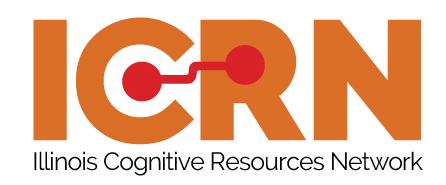
Dementia Stories

Sharing your experiences could help someone else who is living with dementia.
Dementia Journey

For both the person with dementia and the family members, there are ups and downs along the way. Learning to adjust takes time and education.
Dementia Friendly

See if your community is recognized as Dementia Friendly and find ways to support the Dementia Friendly Illinois efforts.

Resources
Use Chicago 211 to find organizations, agencies and providers with expertise in Alzheimer’s and related dementias near you for personal connections to help with your journey.
Common Dementia Questions
What is Alzheimer’s disease?
Alzheimer’s disease is a form of dementia that causes abnormal changes in the brain, mainly affecting memory and cognitive function. It is a progressive disease, which causes people to forget basic information and eventually interferes with their ability to perform everyday activities and tasks.
What is the difference between Alzheimer’s disease and dementia?
Alzheimer’s disease is a type of dementia. Dementia is the chronic loss of thinking, remembering, and reasoning skills that interferes with a person’s daily life and activities. Alzheimer’s disease is the most common cause of dementia among older people.
What are the early signs of Alzheimer’s disease?
Although no two cases of are the same, memory problems are typically one of the first signs of Alzheimer’s disease. Other aspects of thinking, such as difficulty finding the right words, vision/spatial issues, and impaired reasoning or judgment, may also indicate the very early stages of Alzheimer’s disease.
What are the stages of Alzheimer’s disease?
Alzheimer’s disease has four stages: preclinical, early (sometimes known as mild), middle (moderate), and late (commonly known as severe) (severe). People with Alzheimer’s disease appear to be symptom-free during the preclinical period, although harmful changes in the brain are occurring. The indicators listed above may be displayed by someone who is in the early stages of Alzheimer’s disease.
Memory loss and confusion worsen as Alzheimer’s disease develops to the middle stage, and people may have difficulty recognizing relatives and friends. People with Alzheimer’s disease lose their ability to communicate as the condition progresses. They may sleep more than usual, lose weight, and have difficulty swallowing. They will eventually require total care.
Is Alzheimer’s disease hereditary?
Just because a family member has Alzheimer’s disease does not mean that you will get it, too. Most cases of Alzheimer’s are late-onset. This form of the disease occurs in a person’s mid-60s and is not linked to a specific genetic mutation.
Early-onset Alzheimer’s disease, which is rare, can be caused by mutations, or changes, in certain genes. If one of the gene mutations is passed down, the child will usually — but not always — have the disease. For other cases of early-onset Alzheimer’s, research shows other genetic components are involved.
Is there a cure for Alzheimer’s disease?
Currently, there is no cure for Alzheimer’s disease. According to some reports, coconut oil or dietary supplements can cure or prevent Alzheimer’s disease. These statements, however, are not backed up by scientific research.
The U.S. Food and Drug Administration (FDA) has approved several drugs to treat people with Alzheimer’s disease, and certain medicines and interventions may help control behavioral symptoms.
News
A Dementia-Friendly Collaboration: How Gardening can Improve the Lives of People with Dementia
Gardening can be a natural therapy for older adults and people living with dementia, offering a variety of benefits including promoting activity, creativity, and exercise that supports heart health. Research shows that gardening is also beneficial to the brain by boosting mood, improving emotional well-being, and lowering the risk of stroke and dementia. Another advantage…
Welcome Dementia Friendly Illinois Quad Cities!
Visit their page to learn more!
Continue Reading Welcome Dementia Friendly Illinois Quad Cities!
Subscribe to the ICRN E-News blasts
Enter your email address to subscribe to our news posts and receive updates directly in your inbox.





